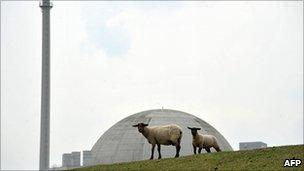Nuclear phase-out can make Germany trailblazer - Merkel
- Published

Germany has relied on nuclear power for almost a quarter of its electricity
German Chancellor Angela Merkel has said a decision to phase out nuclear power by 2022 can make her country a trailblazer in renewable energy.
Ms Merkel said Germany would reap economic benefits from the move.
Germany is the biggest industrial power to renounce nuclear energy, in a policy reversal for the governing centre-right coalition.
Mrs Merkel set up a panel to review nuclear power following the crisis at Fukushima in Japan.
The crisis, triggered by an earthquake and tsunami in March, led to mass anti-nuclear protests across Germany.
The anti-nuclear drive boosted Germany's Green party, which took control of the Christian Democrat stronghold of Baden-Wuerttemberg, in late March.
Analysts say Mrs Merkel may be eyeing a future coalition with the Greens.
'Opportunities'
Mrs Merkel said that in its "fundamental" rethink of policy, Germany could set an example for other countries.
"We believe we as a country can be a trailblazer for a new age of renewable energy sources," the German chancellor was quoted as saying by AFP news agency.
"We can be the first major industrialised country that achieves the transition to renewable energy with all the opportunities - for exports, development, technology, jobs - it carries with it."
She also said that electricity in the future should be "safer and at the same time reliable and affordable", linking the decision to step back from nuclear power to the crisis in Japan.
"We learned from Fukushima that we have to deal differently with risks," she said.
Under the German plan the country's seven oldest reactors - which were taken offline for a safety review immediately after the Japanese crisis - would never be used again.
An eighth plant - the Kruemmel facility in northern Germany, which was already offline and has been plagued by technical problems - would also be shut down for good.
Six others would go offline by 2021 at the latest and the three newest by 2022.
The previous German government - a coalition of the centre-left Social Democrats (SPD) and the Greens - decided to shut down Germany's nuclear power stations by 2021.
However, last September Ms Merkel's coalition scrapped those plans - announcing it would extend the life of the country's nuclear reactors by an average of 12 years.
The decision to extend was unpopular in Germany even before the radioactive leaks at the Fukushima plant.
Following Fukushima, Mrs Merkel promptly scrapped her extension plan, and announced a review.
Germany's nuclear industry has argued that an early shutdown would be hugely damaging to the country's industrial base.
Before March's moratorium on the older power plants, Germany relied on nuclear power for 23% of its energy.
- Published30 May 2011
- Published30 May 2011
- Published3 May 2011
- Published25 May 2011
- Published25 April 2011
- Published15 March 2011
- Published18 March 2011